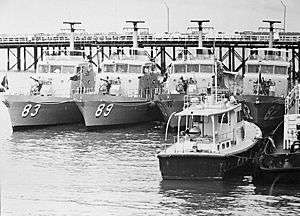HMAS Adroit (P 82)
HMAS Adroit (P 82) was an Attack-class patrol boat of the Royal Australian Navy (RAN).
 HMAS Adroit (at right) with three other Attack class patrol boats | |
| History | |
|---|---|
| Builder: | Evans Deakin and Company |
| Laid down: | August 1967 |
| Launched: | 3 February 1968 |
| Commissioned: | 17 August 1968 |
| Decommissioned: | 28 March 1992 |
| Fate: | Sunk as target |
| General characteristics | |
| Class and type: | Attack-class patrol boat |
| Displacement: |
|
| Length: | 107.6 ft (32.8 m) length overall |
| Beam: | 20 ft (6.1 m) |
| Draught: |
|
| Propulsion: |
|
| Speed: | 24 knots (44 km/h; 28 mph) |
| Range: | 1,200 nautical miles (2,200 km; 1,400 mi) at 13 knots (24 km/h; 15 mph) |
| Complement: | 3 officers, 16 sailors |
| Armament: |
|
Design and construction
The Attack class was ordered in 1964 to operate in Australian waters as patrol boats, based on lessons learned through using the Ton-class minesweepers on patrols around Borneo during the Indonesia-Malaysia Confrontation, and to replace a variety of old patrol, search-and-rescue, and general-purpose craft.[1] Initially, nine were ordered for the RAN, with another five for Papua New Guinea's Australian-run coastal security force, although another six ships were ordered to bring the class to twenty vessels.[1] The patrol boats had a displacement of 100 tons at standard load and 146 tons at full load, were 107.6 feet (32.8 m) in length overall, had a beam of 20 feet (6.1 m), and draughts of 6.4 feet (2.0 m) at standard load, and 7.3 feet (2.2 m) at full load.[1][2] Their propulsion machinery consisted of two 16-cylinder Paxman YJCM diesel engines, which supplied 3,460 shaft horsepower (2,580 kW) to the two propellers.[1][2] The vessels could achieve a top speed of 24 knots (44 km/h; 28 mph), and had a range of 1,200 nautical miles (2,200 km; 1,400 mi) at 13 knots (24 km/h; 15 mph).[1][2] The ship's company consisted of three officers and sixteen sailors.[2] The main armament was a bow-mounted Bofors 40 mm gun, which was supplemented by two .50 calibre M2 Browning machine guns and various small arms.[1][2] The ships were designed with as many commercial components as possible: the Attacks were to operate in remote regions of Australia and New Guinea, and a town's hardware store would be more accessible than home base in a mechanical emergency.[3]
Adroit was laid down by Evans Deakin and Company at Brisbane, Queensland,[4] in August 1967, launched on 3 February 1968 and commissioned on 17 August 1968.[4]
Operational history
The patrol boat was transferred to the Fremantle Port Division of the Royal Australian Navy Reserve in March 1983.[4]
Fate
Adroit paid off on 28 March 1992. The patrol boat was sunk as a target by A-4 Skyhawk aircraft of No. 2 Squadron RNZAF on 8 August 1994.[5] The wreck is located in the Rottnest ship graveyard, west of Rottnest Island.[5]
Citations
- Gillett, Australian and New Zealand Ships Since 1946, p. 86
- Blackman (ed.), Jane's Fighting Ships, 1968–69, p. 18
- The Patrol Boat, Australian National Maritime Museum
- Gillett, Australian and New Zealand Ships Since 1946, p. 87
- Garratt, Dena; Green, Jeremy (2006) [1999]. Précis of the wrecks in the ship’s graveyard, Rottnest (PDF). Report—Department of Maritime Archaeology (Report). Western Australian Museum. Retrieved 15 August 2015.
References
- Blackman, Raymond, ed. (1968). Jane's Fighting Ships, 1968–69 (71st ed.). London: Jane's Publishing Company. OCLC 123786869.
- Gillett, Ross (1988). Australian and New Zealand Warships Since 1946. Brookvale, New South Wales: Child & Associates. ISBN 0-86777-219-0. OCLC 23470364.
- "The Patrol Boat". Australian National Maritime Museum. Archived from the original on 6 July 2011. Retrieved 30 June 2011.